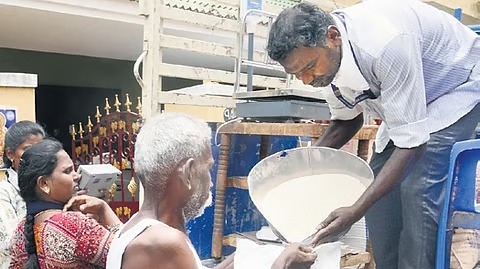Tamil Nadu is rolling out a new welfare service that will bring essential ration items directly to the homes of elderly residents and those with disabilities who find it difficult to visit fair price shops. Chief Minister M.K. Stalin will officially launch the initiative, called the Chief Minister’s Thayumanavar Scheme, today.
The program will cover people over 70 years of age and households where members are differently abled and cannot travel to collect their supplies. The aim is simple — to make sure those who need food support the most can receive it without stress, long waits, or physical strain.
How It Will Work
Every month, on the second Saturday and Sunday, staff from the state’s cooperative department will deliver ration supplies such as rice, wheat, sugar, palmolein oil, and toor dal. These mini-vans will be equipped with weighing machines and biometric devices so that authentication and distribution happen at the doorstep itself.
About 16.73 lakh ration cards will be covered under the scheme, benefiting nearly 21.7 lakh people. Most of these are families with elderly members, while others include households where all members are differently abled.
Why It Matters
For many seniors and persons with disabilities, collecting ration items means depending on friends, neighbours, or paid help. This monthly home delivery removes that burden and ensures they have consistent access to essentials. It also means less risk for those with health or mobility issues who currently have to travel to crowded ration shops.
The government has built transparency into the process — commodities will be weighed in front of beneficiaries, and biometric verification will be done before handing them over.
The Bigger Picture
Tamil Nadu’s public distribution network serves over 7 crore people through more than 34,000 ration shops. While the system already has a wide reach, this marks a shift towards inclusive service delivery, tailored for specific groups who face barriers to access.
The scheme is expected to cost around ₹30 crore annually and builds on a pilot run in Chennai and nine other districts earlier this year. Officials say the trial helped fine-tune the process so that the state-wide rollout could happen smoothly.
Looking Ahead
If the program proves successful, it could become a model for expanding home delivery to other welfare services — not just in Tamil Nadu but across India. For now, the expectation is that it will make life easier for thousands of households that no longer have to worry about how to collect their monthly provisions.
The real win here is that it combines efficiency with dignity, ensuring people get what they’re entitled to without having to struggle for it.
Sources: New Indian Express, DT Next, Dev Discourse, The Logical Indian, New Kerala, IANS via Sakshi Post, The Week
